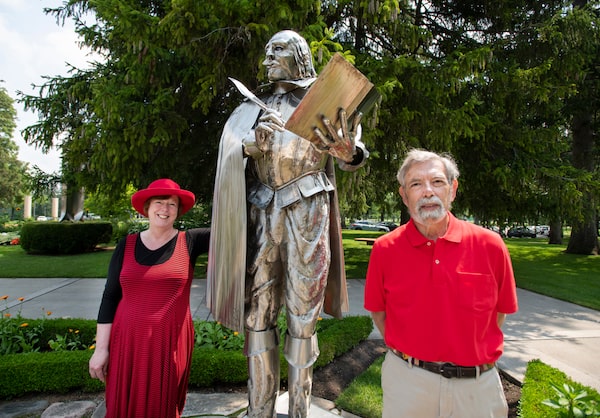
Kim Thompson and Barry Becker, volunteers with the Stratford Festival, are outside the Festival theatre in Stratford, Ont. on July 28, 2021.Fred Lum/The Globe and Mail
Without the brigade of volunteers known as Friends of the Festival – or FOF, to those in the know – the Stratford Festival wouldn’t be the same. In normal times, you’d find these Friends giving of their time to operate information booths, open doors for patrons and lead tours of the theatre company’s garden or archives. They’re hard to miss; they are, indeed, friendly.
In this unusual pandemic season, however, the Friends have had to shift what they do. Now, they’re asking COVID-19 screening questions at the entrance to Stratford’s outdoor stages and helping maintain physical distancing in the concession lines.
But they haven’t pivoted away from friendliness.
“Have you travelled outside of the country in the last 14 days?” one older masked volunteer asked me a few weeks ago – and I answered, with a trace of weariness, in the negative.
“Oh, that’s too bad,” he replied, with a wink and no doubt a smile.
The effects of the pandemic on arts volunteers is not something I’d thought as much about as, say, its effects on artists, administrators and audiences. But according to a report published earlier this year by CharityVillage and the Portage Group, most Canadian charitable and non-profit organizations have lost volunteers – with a quarter losing more than 75 per cent of them in the first year of the pandemic.
Arts organizations have missed volunteers, and volunteers have missed arts organizations. Barry Becker, the vice-president of FOF, built his retirement in part around volunteering at the Stratford Festival; he and his wife moved here from Detroit almost 14 years ago.
“We both love Stratford and, to be perfectly honest, we love Canada,” says Becker, 75, a soft-spoken former academic adviser who first visited the town with a school group to see Troilus and Cressida back in 1963. “We applied for landed-immigrant status about the time we were planning to retire and, luckily enough, Canada said okay.”
Young people will sometimes volunteer in theatres until they can get hired by them, but Becker went in the opposite direction. He worked as a paid usher at the Stratford Festival until he was able to become a Friend; at times, there has been a three-year waiting list for FOF openings. There’s also an interview to pass and a small membership fee to pay before you can join.
But FOF has not been untouched by the pandemic. It usually has about 200 volunteers in its ranks. That’s closer to 170 at the moment. Not all Friends feel comfortable interacting with the public yet, so the requirement to volunteer 50 hours a season has been waived for now.
There’s been no problem filling shifts, nevertheless. In fact, FOF has only been allowing its volunteers to sign up for them two weeks in advance.
“There was some concern that if we put out the whole season, some eager folks would be sitting at their computer and take everything,” Becker explains.
Kim Thompson, FOF’s president, exemplifies such eagerness. The week I spoke with her, she told me she’d already put in five shifts, part of hundreds of volunteer hours she’d worked so far this season.
There has been a lot of work for the executive to do behind the scenes at FOF, helping the festival respond to each of the provincial government’s shifts in direction and restrictions.
Training has been moved online, and a brand new web-based volunteer management system has been created by a Friend named Gail Tolley, a former vice-president of human resources for the Canada Mortgage and Housing Corp. Thompson has dubbed her “the wizard of FOF.” “She’s given almost 1,000 hours of volunteer time since January getting it all up and running,” she says.
Thompson, 63, is another Friend who fell in love with the Stratford Festival on a school trip. She’s originally from an Ontario farming community outside the village of Dundalk and married to a doctor based in Stratford. He’s now working at vaccination clinics in the city and surrounding towns such as St. Mary’s and Exeter, and there have been times when they’ve had to isolate after he came in contact with COVID-19 cases at work.
Volunteering is the opposite of isolating: Thompson enjoys giving her time to the festival because of all the “interesting, wonderful people you meet and the conversations you are privileged to have,” she says. “We had a family this year who had not seen each other since COVID – and they reunited here in Stratford.”
“Time travels in divers paces with divers persons,” says Rosalind in As You Like It, and it’s a bit of a paradox that as a person’s time on this planet gets shorter, they are more inclined to give it away as a volunteer.
I was thinking about this as Becker showed me his watch, which was built, in part, with material from the old Tom Patterson Theatre after it was demolished.
Becker was at the very last public performance in that space, and he told me that, after the bows, those in attendance were invited to shout out the names of performers who were meaningful to them. He called out Peter Donaldson, an actor who had played James Tyrone Jr. in Long Day’s Journey Into Night and Timon of Athens on that stage before he died in early 2011, at the age of 57.
Donaldson was meaningful to me, too; we paused our interview to remember him.
Despite all the rumours that people are emerging from lockdowns grumpy and rude, Becker says the patrons he’s been encountering have been in great spirits.
“They’re so thrilled to be here,” he says, “and we’re so thrilled to be here, too.”
Keep up to date with the weekly Nestruck on Theatre newsletter. Sign up today.
 J. Kelly Nestruck
J. Kelly Nestruck